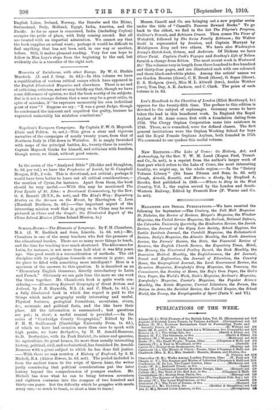ScnooL - Booxs. — The Elements of Language. By F. H. Chambers, rs.A. (J.
W. Ruddock and Sons, Lincoln. Is. 6d. net.)—Mr. Chambers is one of the many teachers who feel the pressure of the educational burden. There are so many more things to teach, and the time for teaching is so much shortened. The allowance for Latin, for instance, is not more than half what it was fifty years ago. One good result is a reconsideration of methods. The old discipline with its prodigious demands on memory is gone; can its place be filled with something more intelligent ? Here is a specimen of the answers to this question. It is described as an " Elementary English Grammar, directly introductory to Latin and French." Obviously we can gain time the more we can work the three together. Mr. Chambers's book is quite worth con- sidering.—Elementary Regional Geography of Great Britain and Ireland, by J. B. Reynolds, B.A. (A. and C. Black, Is. 4d.), is a fully illustrated book in which due regard is paid to the things which make geography really interesting and useful. Physical features, geological formations, mountains, rivers, &c., economic and political facts, and the like have their place. All the information is summarised ; test questions are put; in short, a useful manual is provided.—In the series of " Cambridge County Geographies," Edited by Dr. F. H. H. Guillemard (Cambridge University Press, ls. 6d.), of which we have had occasion more than once to speak with high praise, we have Derbyshire, by H. H. Arnold-Bemrose, Sc.D. Derbyshire, with its Peak District, its mines and quarries, its agriculture, its great houses, its more than usually interesting history, political, civil, and ecclesiastical, has furnished Dr. Arnold- Bemrose with a great subject to which he has done full justice. —With these we may mention A History of England, by S. H. Michell, B.A. (Alston Rivers, 2s. 6d. net). The period included is from the earliest times to the reign of Queen Anne, the writer justly considering that political considerations put the later history beyond the comprehension of younger readers. Mr. Michell has done what he can to bring between seventeen and eighteen centuries into the compass of two hundred and thirty-one pages. But the difficulty which he grapples with meets every one,—so much to teach, so short a time to learn






































 Previous page
Previous page